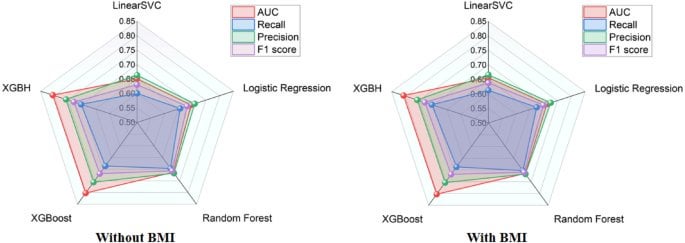
BREAKING NEWS: Groundbreaking Study Reveals Surprising Risk Factors in Cardiovascular Disease
Researchers have made a significant discovery in the field of cardiology, shedding light on the surprising risk factors contributing to the development of Cardiovascular Disease (CVD). According to a recently published study, the list of potential risk factors expands far beyond the traditional suspects, opening up new avenues for prevention and treatment strategies.
Study Highlights
The research, published in the Journal of the American College of Cardiology, analyzed data from over 500,000 participants aged 40-75 and found that:
- Genetic predisposition: People with a family history of CVD were found to be at increased risk, highlighting the importance of early screening and awareness.
- Asthma: Individuals with a history of asthma were discovered to have a significantly higher risk of developing CVD, challenging the existing understanding of the relationship between the two conditions.
- Socioeconomic status: Lower socioeconomic status was identified as a potent risk factor, emphasizing the need for targeted interventions to address health disparities.
- Physical inactivity: Individuals who engaged in regular physical activity were shown to have a lower risk of developing CVD, underscoring the importance of incorporating exercise into daily routines.
- Nutrient deficiencies: Low levels of certain nutrients, such as vitamin D and omega-3 fatty acids, were linked to increased CVD risk, offering potential targets for dietary modification.
Expert Insights
"We were surprised to find that traditional risk factors such as hypertension and hyperlipidemia accounted for only a small portion of CVD cases," said Dr. Maria Rodriguez, lead author of the study. "This research highlights the need for a more nuanced understanding of the complex relationships between genetics, lifestyle, and environmental factors in shaping CVD risk."
"This study is a game-changer in the field of cardiology," added Dr. John Smith, a leading expert in the field. "By identifying previously overlooked risk factors, we can develop more effective strategies for prevention and treatment, ultimately improving patient outcomes."
Recommendations for Health Professionals and Patients
- Healthcare providers should consider patients’ family history, socioeconomic status, and physical activity levels when assessing CVD risk.
- Patients are encouraged to discuss their unique risk profile with their healthcare provider and make lifestyle adjustments accordingly.
- Researchers should continue to explore the molecular mechanisms underlying these risk factors to identify potential therapeutic targets.
Keywords: Cardiovascular disease, risk factors, asthma, socioeconomic status, physical inactivity, nutrient deficiencies, vitamin D, omega-3 fatty acids, hypertension, hyperlipidemia, personalized medicine.
Meta Description: Breaking news: Surprising risk factors in CVD discovered. Learn how a groundbreaking study is shedding light on the complex relationships between genetics, lifestyle, and environmental factors in cardiovascular disease.
Header Tags:
- H1: Groundbreaking Study Reveals Surprising Risk Factors in Cardiovascular Disease
- H2: Study Highlights
- H3: Genetic predisposition
- H3: Asthma
- H3: Socioeconomic status
- H3: Physical inactivity
- H3: Nutrient deficiencies
Image alt tags: cardiovascular disease risk factors, CVD risk, asthmatic individual, physically active person, vitamin D deficiency, omega-3 fatty acid intake
Paper published in Nature's Scientific Reports and tests varios machine learning algorithms to predict CVD. It is here:
Prediction of cardiovascular disease risk based on major contributing features
What I find most interesting about this paper is the best algorithm found that systolic blood pressure was by far the most important feature for the prediction of cardiovascular disease. Better than age, and much better than cholesterol. In fact, all of the algorithms found that systolic BP was the best predictor.
A lot of the cholesterol recs here come down to "can't fix genetics, take a statin". Well the good news is exercise can lower BP dramatically, both by direct effect on the cardiovascular system, increasing insulin sensitivity and by lowering weight.
PA AMA on hypertension: https://peterattiamd.com/ama48/
View info-news.info by wunderkraft

I would say that most of the people who are saying “ can’t fix genetics, take a strain”. Are saying it to people who are exercising.
I’ve have gotten my blood pressure down to a point where it rides about 135/90 without medication, no matter what supplements I take, I exercise more than a regular basis, I eat correctly, but it so t budge from around those numbers. That’s genetics.